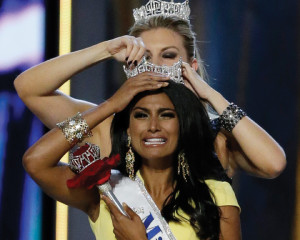
The crowning of the 2014 Miss America Pageant on Sept. 15 sparked an influx of response and criticism on various social media sites like Twitter.
Nina Davuluri made history as the first woman of Indian-American descent to win the pageant. The 24-year-old Syracuse, N.Y. native embraced her Indian heritage by performing a Bollywood Fusion dance for the talent portion of the show.
When Davuluri won, she received criticism on social media sites.
“Miss America is a terrorist. Whatever. It’s fine,” Twitter user @_AudreyAnn said. Several other users posted similar responses like, “Miss America right now or miss Al Qaeda?” @SHANN_wow said.
Davuluri’s father immigrated to the U.S. 30 years ago and Davuluri is an American citizen, born in New York. She grew up in the U.S., attended the University of Michigan and won Miss America by complying with the rules.
Some students at SMU were offended by the racist comments posted online. Sophomore and member of the Indian Student Association Armaan Kang, believed that the tweets displayed the ignorance of some people in the U.S. today.
“It’s sad that in the 21st century, people use race as a means of insulting others,” Kang said. “It brings to light the fact that people clearly aren’t educated in the ways they should be about diversity in the U.S.”
Sophomore Alex Fulton had a similar opinion: “I also don’t think it’s appropriate to judge someone based on their appearance.”
The public, online comments about Davuluri showed “the very negative side of social media,” said Tony Pederson, SMU professor and the Belo Foundation Endowed Distinguished Chair in Journalism.
Social media can have a positive side by giving people the freedom to express themselves and get information out quickly. “All of this is part of what the immediacy of social media can do,” Pederson said.
Steve Lee, an expert in social media and communications professor at SMU, has witnessed the change in tone and speech online.
“While hate and abuse are a part of our society, those sentiments are most often expressed privately,” Lee said. “Social media has given haters a place to vent their frustrated, angry feelings publicly.”
According to Lee, social media is still young, less than 10 years old, but its age has not stopped its adoption into daily life and its growth in both popularity and influence.
“This growth and casual usage has given voice to all kinds of people, both kind and unkind,” Lee said. Because of social media’s instantaneous nature, people are able to post their opinions, often anonymously, at a much faster rate.
Despite their controversy, the posts made by Twitter users are protected under the First Amendment as freedom of speech. Disallowing these posts would be taking away a right protected by the Constitution.
“Hate speech is protected speech whether we like it or not,” Pederson said. “If we start trying to limit this we run risk of censorship.”
However, the American public is calling this freedom into question as hate speech is becoming more prevalent and widespread, according to a Geography of Hate Map created by Humboldt State University that maps negative tweets and their location.
Davuluri did not directly respond to the negative comments made about her win. She only posted on Twitter to thank those who were supporting her and her recent win. Davuluri is pursuing her platform of “Celebrating Diversity through Cultural Competency.” On Sept. 19 she furthered this platform with the release of her social media campaign, encouraging cultural awareness and diversity on social media sites.
“I’m so proud to be the first Miss America of Indian descent,” Davuluri said in a press conference on Sept. 15. “I want to use this opportunity to encourage positive dialogue among all Americans about the ways in which we are all unique and how that makes us a stronger country.”








